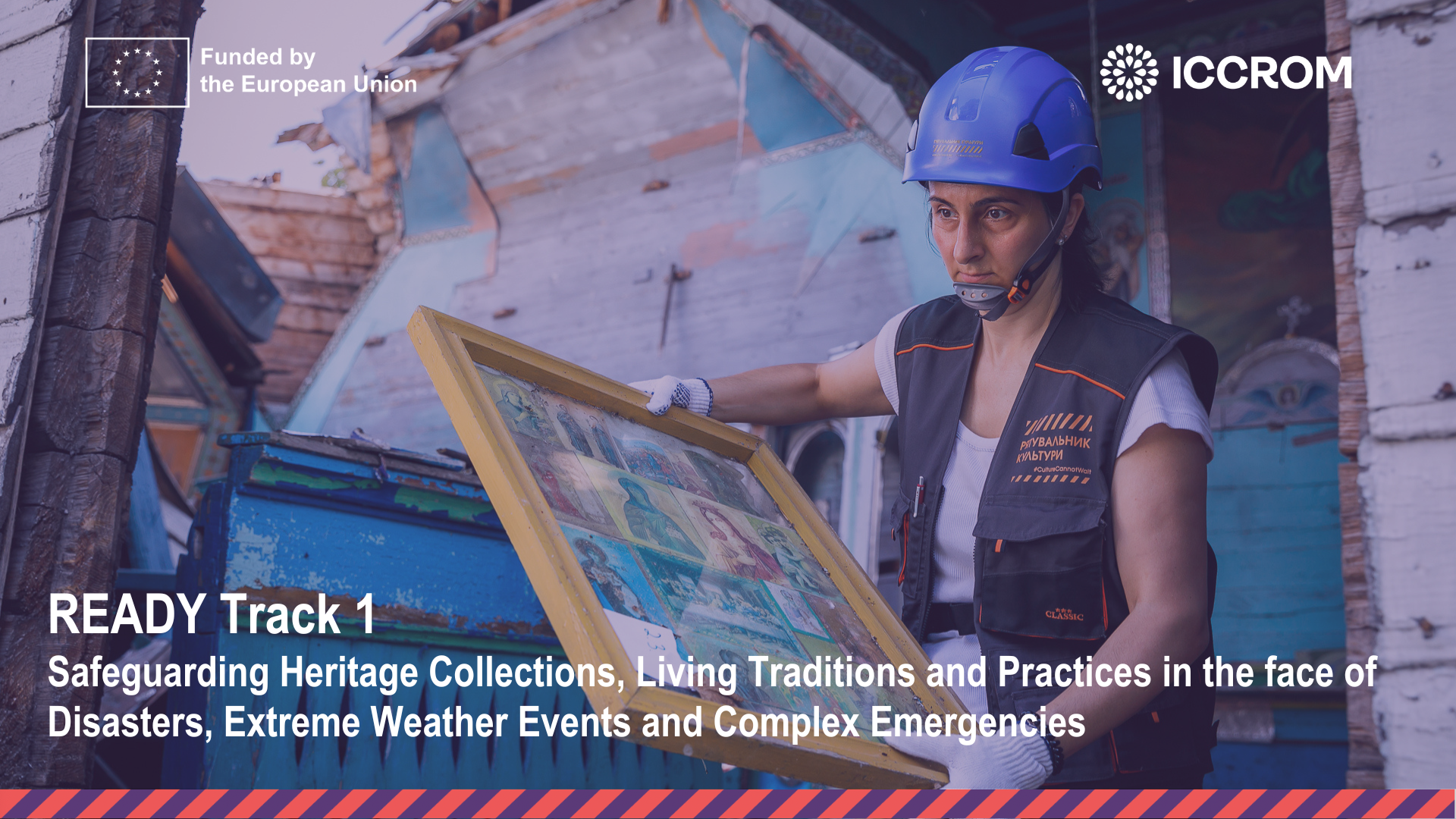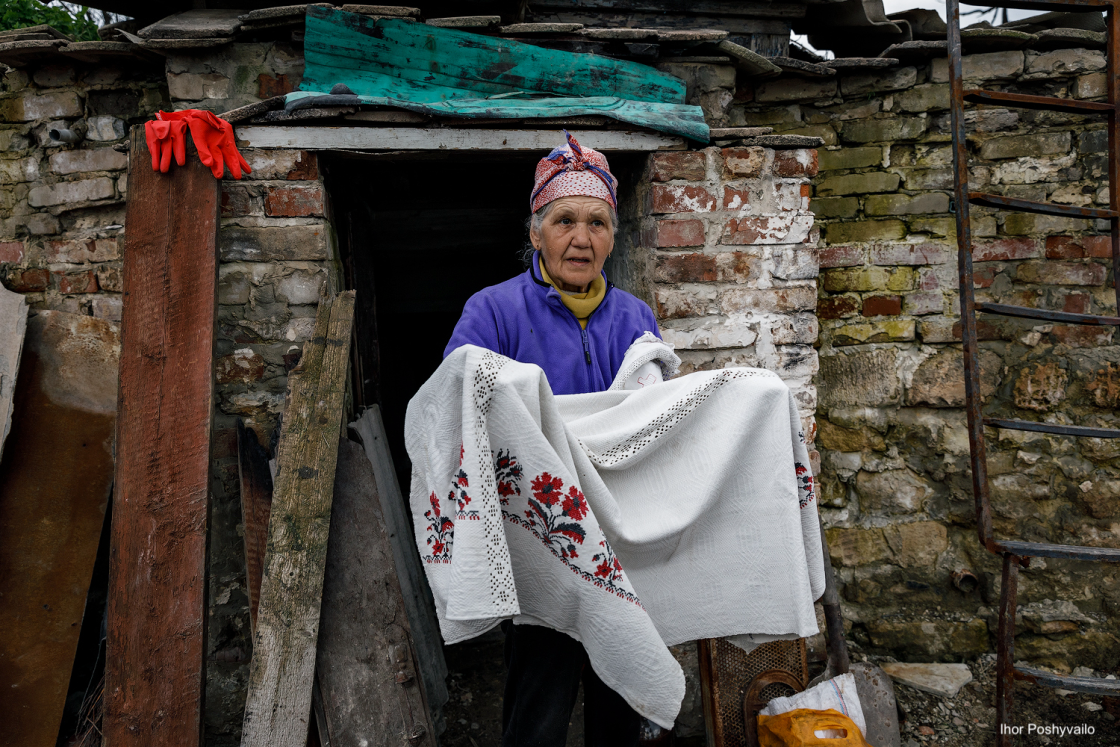Mode of Delivery: The training will consist of both online and in-person sessions, followed by field projects in participants' home countries, lasting 6 months.
Organizers
ICCROM, through its international capacity development programme First Aid and Resilience for Cultural Heritage in Times of Crisis (FAR), in partnership with the European Commission's Directorate-General for Education, Youth, Sport and Culture (DG EAC).
This initiative is funded by the European Union through the Creative Europe Programme.
Track 1 of the READY Initiative will be hosted by the Ministry of Culture of the Republic of Latvia.
The training will be designed with the cooperation of the following technical partners:
- Agency for Cultural Resilience (ACURE), Ukraine
- Centre des monuments nationaux, France
- Department of Antiquities of Cyprus (DoA), Cyprus
- Dirección General de Patrimonio Cultural y Bellas Artes, Spain
- Ministry of Culture and Media, Republic of Croatia
- Museum of King Jan III's Palace at Wilanów, Poland
- Museus e Monumentos de Portugal (MMP), Portugal
- National Institute of Heritage, Romania
- National Memorial to the Heavenly Hundred Heroes and Revolution of Dignity Museum (Maidan Museum), Ukraine
- National Research Council of Italy, Institute of Atmospheric Sciences and Climate (CNR-ISAC), Italy
- National Research Council of Italy, Institute of Heritage Sciences (CNR-ISPC), Italy
- Royal Institute for Cultural Heritage (KIK-IRPA), Belgium
In alignment with the principles of ICCROM and our funding partner, the READY project is committed to inclusivity and celebrating Europe’s diversity. We are actively continuing to enlist partners to ensure a truly representative and collaborative European initiative.
Why this course?
In an era of escalating crises, the intersections of natural and human-made hazards—ranging from climate-driven floods, fires, and droughts to violent conflicts, urban expansion, and environmental degradation—are creating more frequent, severe, and complex disasters. These compound risk events not only endanger lives and livelihoods but also threaten cultural heritage, erasing the very traditions, places, artifacts and knowledge systems that anchor communities in times of upheaval.
How can we protect heritage from mounting risks while unlocking its potential to reduce disaster impacts, adapt to a changing climate, and promote lasting peace?
READY- Resilience for Heritage in the Face of Disasters, Climate Risks and Complex Emergencies is a groundbreaking initiative aimed at strengthening capacities for protecting all forms of heritage from extreme risks including climate change-driven disasters and armed conflicts in Europe and beyond.
Within the framework of the READY project, we are pleased to invite applications from countries participating in the Creative Europe programme, for the Track 1 international course on Safeguarding Heritage Collections, Living Traditions and Practices in the face of Disasters, Extreme Weather Events and Complex Emergencies.
About the Course
READY track 1: Safeguarding Heritage Collections, Living Traditions and Practices in the face of Disasters, Extreme Weather Events and Complex Emergencies is conceived as a hybrid course. This interdisciplinary training emphasizes a systems-based approach to managing risks to heritage collections—whether in museums, libraries, archives, or places of worship—as well as to living traditions and associated knowledge systems.
Recognizing that disasters do not occur in isolation and that heritage institutions may not always have immediate support, a core component of the course will focus on cross-sector cooperation and coordination among disaster risk management, climate science, civil protection, armed forces, and heritage agencies before, during, and after disasters.
The course will provide participants with the knowledge and skills to assess and mitigate disaster and conflict risks to movable and living heritage, factoring in key risk drivers such as climate change and socio-economic vulnerabilities. By equipping participants with skills to tap into community-held traditional knowledge and practices, the training aims to engage local communities in safeguarding at-risk heritage while enhancing resilience and social cohesion.
Course structure
The course will comprise 4 key phases
- Phase 1: Online Orientation and Introduction to Key Concepts
Dates: 16-20 hours over 4 weeks, with half-day sessions (Mon-Thu) between the end of May and the end of June 2025.
- Phase 2: Three-Week In-Person Training on Movable and Intangible Cultural Heritage
Dates: Starting after 15 July 2025. The training will span 15 days, with one day off between each week. Participants are advised to seek approval from their respective employers for a minimum stay of 17 days in Riga, Latvia. Exact dates will be provided upon selection.
Location: Riga, Latvia
- Phase 3: Follow-up Field Projects Implemented by Participants
Dates: August 2025 – February 2026
Note: Upon completion of Phase 2: In-Person Two-Week Workshop, participants are required to propose joint or individual projects to be carried out in their respective home countries aimed at enhancing regional, national and local capacities for managing the risk of conflicts, disasters and extreme weather events for heritage collections and living traditions, practices as well as knowledge systems. The resources for implementing field projects will be supported by participants’ institutions.
- Phase 4: International Online Meeting for Dissemination of Field Project Outcomes
Dates: To be decided upon completion of the follow-up field projects.
Course Fee
This course is fully funded, with no participation fee. All expenses related to travel and accommodation for the in-person training component will be covered by ICCROM. Your only requirement is a strong commitment to learning and applying your skills.
Who can apply
We invite applications from diverse professionals who are interested in this unique and extensive training and those who wish to make a difference by protecting at-risk heritage and serving their respective communities. Participants must be from countries participating in the Creative Europe programme. (Please refer to the list of eligible European and Non-European countries participating in the Creative Europe Programme)
In particular, the course may be of interest to:
- Professionals working to safeguard living traditions, knowledge, and practices, as well as heritage collections in diverse settings (museums, libraries, archives, archaeological or living heritage sites).
- Cultural bearers and community leaders who are committed to safeguarding at-risk movable and living heritage.
- Professionals working in fields such as civil protection, disaster risk management, climate change adaptation, fire risk management, and emergency response.
Priority Considerations
Preference will be given to applicants who:
- Must have full support from their employing institutions or local authorities to implement post-training field projects.
- Should have prior experience in successfully safeguarding movable and living heritage following a disaster or conflict.
If you are passionate about heritage protection and resilience-building, we encourage you to apply!
How to apply?
To apply, please complete all mandatory fields in the online application form by 20 April 2025.
In the application form, you will be required to identify a heritage collection, an intangible heritage element, or a combination of both, which will serve as your case study. Preliminary selection will be finalized by 30 April 2025. If selected, you will be invited for an online interview during the first week of May 2025.
Language
The course will be conducted in English. However, the multilingual team of resource persons will assist participants in understanding core concepts and key terms where necessary. Additionally, a multilingual glossary and bibliography will be provided to further support and enhance the learning experience.
Course Modules
- Assessing the significance of heritage collections in diverse contexts
- Recording oral histories and ensuring the intergenerational transfer of living heritage
- Assessing climate, conflict, and disaster risks to heritage collections, living traditions, knowledge systems, and associated communities
- Risk mitigation and emergency preparedness for movable and living heritage
- Cross-sector cooperation and coordination for emergency response
- First aid to movable and living heritage
- Post-crisis recovery
Using heritage collections, living traditions, knowledge systems, and associated communities for building disaster and climate resilience


